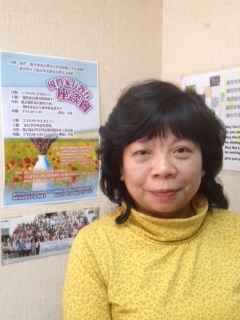Family Education
 “Growing up is not about ‘winning’, if you want to ‘win’ then you will lose”
“Growing up is not about ‘winning’, if you want to ‘win’ then you will lose”
Special interview with Dr. Rosa Law, Director of the Christian Quality Family Education Centre
"Win at the starting line" is the expectation of many parents for their children in Hong Kong, but are these expectations justified? Dr. Law points out that “Growing up is not about “winning”, but about setting goals; the goal is not to score 100 percent but to try one’s best, and if you try your best then you will have reached the goal.” Dr. Law explains that wanting the children to win is equivalent to applying pressure to them, and when there is pressure it becomes difficult to generate interest in learning. While they are young children may still acquiesce to the demands of their parents, but when they grow up children will inevitably rebel and cause friction between the parent and children relationship. In the end will the parents have ‘lost’ or ‘won’?
Dr. Law points out that “Growing up is not about “winning”, but about setting goals; the goal is not to score 100 percent but to try one’s best, and if you try your best then you will have reached the goal.” Dr. Law explains that wanting the children to win is equivalent to applying pressure to them, and when there is pressure it becomes difficult to generate interest in learning. While they are young children may still acquiesce to the demands of their parents, but when they grow up children will inevitably rebel and cause friction between the parent and children relationship. In the end will the parents have ‘lost’ or ‘won’?
Internationally renowned violinist Chen (Vanessa) Mae was forced to practice violin as a child by her ‘tiger mum’, and when she become older she sacked her mother who was her manager in a bid to take back control of her life; in the process she severed all ties with her mother. Vanessa then went on to train in skiing, which was the sport that her mother had always prevented her from participating due to the potential injury she may have suffered to her hands, even representing Thailand in the winter Olympics this year. In reflecting on the relationship with her mother, Ms Chen believes that parents should understand when and where they need to let go and not apply pressure, and hope that one day when she becomes a parent she will know when to let go ('I believe that when you have children there's a certain point when you have to let go and stop pushing. I hope and pray that if I have children of my own I will know when that point is.'). 1
However, even if it is not to win, it is an undisputed fact that children do not like studying or doing homework. So if it cannot be done by force, then how should parents deal with it? Dr. Law points out that the most important thing is to develop your children’s interest for studying or the motivation for learning – curiosity. If children enjoy learning they will like doing homework, and even if they refuse to complete the homework there is no sense in disciplining them; conversely more encouragement should be provided to gradually lead them on the right track. So how can parents help their children develop an interest in learning? If parents set the example for their children to follow by showing and interest and curiosity for the things around them, their children will also enjoy learning. For example, parents can accompany their kids to the library to find information, looking up dictionaries, attend exhibitions, planetariums or science centers because these activities can all help foster an interest in learning. In the end, an interest in learning is founded on the parent-child relationships. Many children love a particular subject because they like a particular teacher, so if parents can show interest in learning then their children will generally mimic this behavior. In your everyday life try to take time to spent with your children, try to listen and understand what they feel so that the appropriate encouragement can be given at the right time. These actions all contribute significantly towards developing a healthy parent-child relationship.
The nurturing of a positive character is even more detrimental to force upon children. Dr. Law points out that children with good character must possess positive vitality. So what is the source of positive vitality? It is in having a positive self-image, to embrace yourself and as a natural extension treat others as you would treat yourself that a positive character can be established. How can parents help establish their children’s self-image? The key is to discover the child’s unique characteristics, and use them to find what will work best for the child. Every child has their individual talent, and not everyone will have exceptional learning abilities. Parents must be patient in their guidance to uncover their child’s uniqueness, so that children will understand their uniqueness and learn to appreciate themselves. The little girl Qian Longhuai who performs the “Happy dance” on TV is a fine example. Despite losing her sight, she still embraces life and gained admission to the prestigious University of California, Berkeley (UC Berkeley) in the United States. Her strong vitality not only allows her to live a rich life, but also provided her with the ambition to become a teacher so she can help other children in need and benefit other people.
Dr. Law pointed out that in fact parents also need to be prepared, so classes are also held in the Middle School for parents to teach them the correct concept of education. Miss Du, a previous attendee at the course notes that the course content provide stimulus for the modern day parents, with a wide range of topics covered that focus in particular on family education, such as how to help children face difficult issues and the roles that parents play in the family.
Source : MailOnline (http://www.dailymail.co.uk/home/index.html)
YMCA Christian Academy (YCA) is a unique, community-oriented private primary school situated in the heart of Hong Kong Island. It offers a broad and balanced international curriculum rooted
Read MoreSingapore’s most forward looking primary school intends to open the doors of its first kindergarten and primary school in Greater China, offering an English and Mandarin immersion programm
Read MoreSchool tours are vital during the admissions process for a child as the tours allow the parents to meet the people responsible for educating their children, observe the school’s facilities, exam
Read MoreStamford American School Hong Kong (Stamford) is a through-train school for students ages 5 to 18 where graduates can receive both an American and IB Diploma* which allows them access to top universit
Read MoreLearning a new language can always be quite intimidating and challenging in the beginning. However, it can prove to be immensely useful in the future. We provide students the opportunity to become
Read MoreWould you like to know more about your child’s English level and other abilities, whether they are from kindergarten to secondary? There is no easy task, however, our experienced cons
Read More




